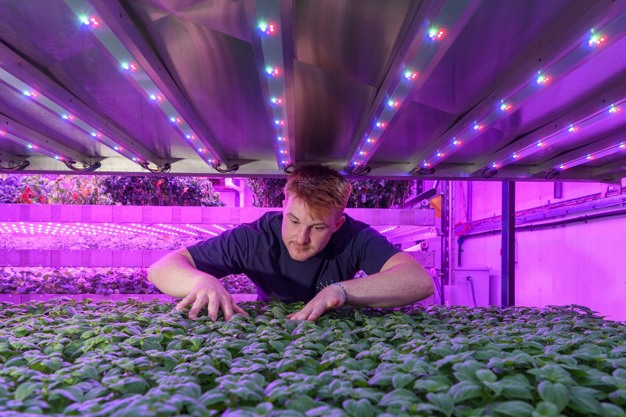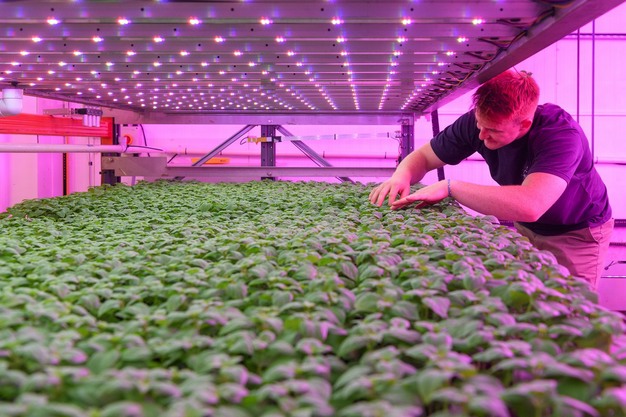Medicinal cannabis research is set to take place in Dundee after the James Hutton Institute secured £350k funding from the Biotechnology and Biological Sciences Research Council (BBSRC).
An additional £867k funding was also secured for two further projects; light pulsing technologies in vertical farming (£305K), and developing genetic tools to accelerate breeding for indoor-grown lettuce (£562k). Support from industry partners totaling £1.22m for these projects brings the total value for the projects to £2.4m.
All three projects will take place at the Institute's newly-established Advanced Plant Growth Centre (APGC), situated at its Invergowrie site. The APGC is part of the Tay Cities Regional Deal partnership supported by £45m from the UK Government and £17m from the Scottish Government. The APGC combines five core facilities, interconnected but independent, to facilitate scientific innovation and discovery.
The three multi-year initiatives are designed to transform horticultural practice and utilize modern breeding approaches to further new products and services. They also have a focus on sustainability, advanced pharmaceutical applications, and genetic research.
BBSRC, which funded the projects through its Protected and Controlled Environment Horticulture initiative, invests in scientific research that aims to push back the frontiers of biology and deliver a healthy, prosperous, and sustainable future.
The first project, (Exploiting Controlled Environments for the Development of Optimised Cannabis Sativa Phenotypes for Pharmaceutical Applications), will aim to support the growing need for medicinal cannabis by helping standardize the product to meet pharmaceutical quality through environment manipulation and the development of new cannabis plant architectures.
Currently, the varieties, or cultivars, vary greatly based on the region they are grown in – creating different cannabinoid profiles. The research in Dundee will aim to use Controlled Environment Agriculture (CEA) technologies to create a consistent product and help the UK maintain its position as the world's largest producer and exporter of medicinal cannabis.
The second project, (Light Pulsing in Vertical Farming for Sustainable Fresh Produce (LightPuls-VF)), will see the Institute become the home of state-of-the-art light pulsing technology. The research will aim to revolutionize how basil and other herbs are grown vertically – improving efficiency, and nutritional quality and reducing energy consumption. The project is firmly focused on sustainability improving food security and reducing the UK's reliance on imported produce.
Derek Stewart, Director of the Advanced Plant Growth Centre, hopes that these projects will keep the Institute at the forefront of scientific research in the UK, furthering its already renowned reputation.
He said: "Both CE-CannPharm and LightPuls-VF are exciting projects for the James Hutton Institute team to be involved with."
"Medicinal cannabis is an increasingly important remedy and is becoming key in alleviating degenerative and neurodegenerative/dysfunctional diseases. We will play an important role in furthering the pharmaceutical quality of these plants, reinforcing the UK's importance on the world stage."
"Research at the APGC will also see our team prove vital in the future food security and sustainability of this nation through our vertical farming project. We hope the success of these projects will be felt for many years to come. We also thank our partners Glass Pharms Ltd and Intelligent Growth Solutions Ltd for their support."
The third project, (Optimising Genetics by Management (GxM) Interactions to Enhance Productivity and Quality in Indoor Lettuce Cultivation), will focus on creating varieties of 'super-lettuce' that thrive in low light conditions, allowing dense urban environments and indoor sites to be viable options for future growth. The research aims to pave the way for a new era of 'hyper-efficient' urban agriculture that will improve both yield and quality by identifying key traits and optimizing them for these previously unviable locations. It is also hoped the research will reduce the industry's carbon footprint and help the UK reach its sustainability goals.
Rob Hancock, Deputy Director of the Advanced Plant Growth Centre, who headed up the funding application for the GxM project said: "To receive this funding is another milestone for the Institute and the Advanced Plant Growth Centre."
"This project will allow our scientists to make exciting advances with lettuce in urban environments by researching low light conditions and developing new varieties that will thrive in these conditions. We extend our thanks to our colleagues at the University of Reading and Tozer Seeds for their backing of the project."
For more information: The James Hutton Institute
The James Hutton Institute
[email protected]
www.hutton.ac.uk
